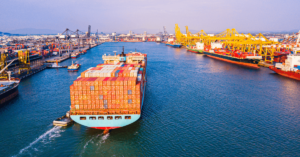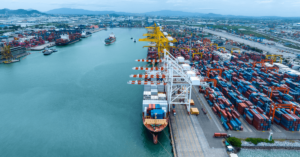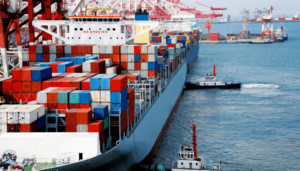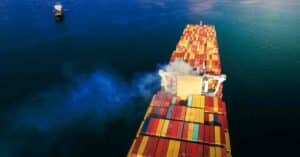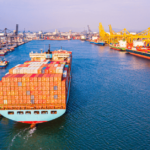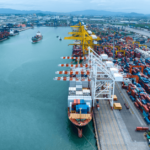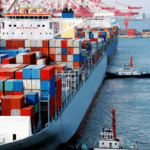What is High Sea Sale In Shipping?
The term ‘sale’ is generally described as the exchange of goods or services for financial consideration. It does not mention where a transaction should take place to qualify as a sale. Hence, it must be assumed that sale transactions or contracts can be made or drawn up from anywhere – land, sea, or air.
Without getting too much into the technicalities of the term, let us take a look at high sea sales.
High sea sale is common in international business. It is usually bulk commodities that are traded this way. A business organization may buy goods in large quantities from an international seller and sell them to buyers while it is in transit by sea to its destination port.
High sea sale is exempt from sales tax, if any, as the transaction is carried out while in international waters.
Typically, any resale carried out by the owner of cargo while it is en route to the port of discharge is termed as a high sea sale. Subsequent to signing a high sea sale agreement, depending on the location of the new owner, the cargo may have to be rerouted to its new destination.
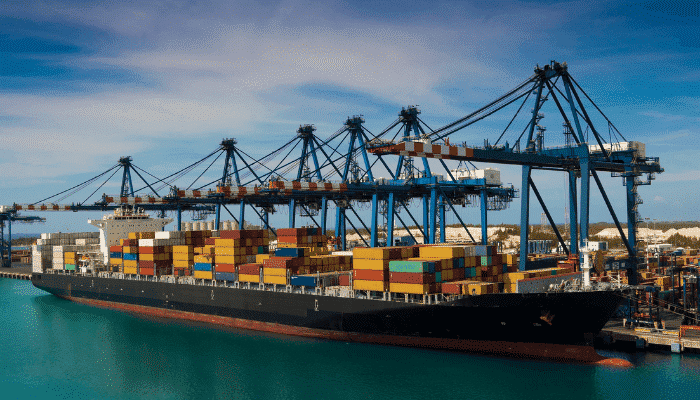
It must be noted that as soon as a high sea sale agreement is reached, the carrier must be informed of details of the new importer.
We can understand high sea sales better with a simple example.
Company A in Bahrain purchases a container load of frozen meat from Company B in India. All financial transactions are settled between the two companies and the container is ready to sail. The transit time between Nhava Sheva port (JNPT) in India and Mina Salman in Bahrain is about 7-8 days.
During the sailing, company A finds a buyer in Bahrain, company C, for its container load of frozen meat. Once the conditions for payment are finalized between company A and company C, the original bill of lading and other shipping documents are endorsed by company A to the name of company C. The title and ownership to the goods, thus shift from company A to company C.
As we can see here, the transaction happens while the cargo is in the international waters, on its way from India to Bahrain. The exporter remains the same (company B), while the final importer has changed from company A to company C. Such a transaction is called a high sea sale.
Here, by high sea, it is meant the international waters that are not covered by the jurisdiction of either country – India or Bahrain.
The ownership of goods can change any number of times while it is on high seas. However, a high sea sale agreement must list all the parties that were involved in the buy-sell transactions related to the particular consignment of goods, while at sea.
Normally, a high sea sale includes 3 parties – the seller, the original or intermediate buyer, and the new buyer. The above example is a clean transaction in which the financial transactions between the original seller and the original buyer are complete. Let us see how it is when the terms between the two are on credit or by bank guarantee.
Bank Guarantee or Letter of Credit
A letter of credit (LC) is an instrument issued by a bank, guaranteeing payment from the buyer to the seller. The LC also guarantees that goods are shipped as agreed between buyer and seller.
Since it is a banking instrument, the LC will show details of the original buyer and seller. Therefore, in the case of a high sea sale, details of these parties have to be changed, endorsed by the new seller and buyer.
Unless this is done, the goods cannot pass customs clearance as the documents will show the wrong buyer and seller. Also, payment for the goods from the new and final buyer has to be remitted to the bank by then.
When goods change hands at high seas, under the letter of credit arrangement, the original buyer will have to endorse the changes in the original documents in custody with the bank. In the above case, company A will endorse the change of title and ownership of the goods and hence the new buyer’s (company C) address will be shown in the shipping documents. Company C makes payment to the bank and collects the shipping documents for clearance of the consignment.
Key Documents in High Sea Sales
Ideally, all the shipping documents that are with the bank have to reflect the new buyer’s name and details. The key documents in a high sea sale are the following:
- High sea sale agreement
- Bill of lading
- Commercial invoice
- Insurance certificate
- Certificate of origin.
High Sea Sale Agreement
The high sea sale agreement is a signed, stamped document. It is an agreement between the original or intermediate buyer and the new buyer detailing the terms and conditions of the resale. The date of this agreement must be between the date of the bill of lading and the vessel’s Expected Time of Arrival (ETA) at the port of discharge.
Bill of Lading
A key shipping document, the bill of lading shows the title and ownership of the goods being shipped. Any change of ownership of the goods should be reflected in this document.
Commercial Invoice
A commercial invoice shows the name and address of the buyer and seller, description, quantity, and value of the goods being shipped. It is mainly used for customs duty calculation etc.
Insurance Certificate
This certificate shows the terms and conditions of insurance of the goods being shipped, the type of insurance, the amount insured for, the beneficiary, etc.
Certificate of Origin
The certificate of origin is issued by the Chamber of Commerce or the relevant authority of the country from where the goods are produced and exported. It shows where the goods are produced.
For the final buyer to file a Bill of Entry at the destination port, all the above documents must be available with the necessary endorsements. In most cases, the original invoice between buyer and seller, as well as all the subsequent invoices in the event of multiple high sea transactions, are also attached to the above documents to establish the trail of transactions.
You might also like to know:
- What is Consolidated Freight in Shipping?
- What is Expedited Freight and Services in Shipping?
- What is Freight Prepaid in Shipping?
- What Does Freight All Kinds (FAK) in Shipping Means?
- What is Tanktainer in Shipping?
Disclaimer: The authors’ views expressed in this article do not necessarily reflect the views of Marine Insight. Data and charts, if used, in the article have been sourced from available information and have not been authenticated by any statutory authority. The author and Marine Insight do not claim it to be accurate nor accept any responsibility for the same. The views constitute only the opinions and do not constitute any guidelines or recommendation on any course of action to be followed by the reader.
The article or images cannot be reproduced, copied, shared or used in any form without the permission of the author and Marine Insight.
Do you have info to share with us ? Suggest a correction

About Author
Hari Menon is a Freelance writer with close to 20 years of professional experience in Logistics, Warehousing, Supply chain, and Contracts administration. An avid fitness freak, and bibliophile, he loves travelling too.
Latest Maritime law Articles You Would Like:
Latest News
- What is the Purpose of DG Shipping?
- What are Logistics Risks?
- How Port and Terminal Operators Can Control Emissions?
- Minimum Quantity Commitment (MQC) and Liquidated Damages in Container Shipping: Concept and Relevance
- MARPOL (The International Convention for Prevention of Marine Pollution For Ships): The Ultimate Guide
- The Ultimate Shipping Container Dimensions Guide
Subscribe To Our Newsletters
By subscribing, you agree to our Privacy Policy and may receive occasional deal communications; you can unsubscribe anytime.




